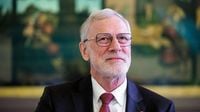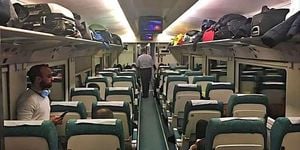On May 9, 2025, the first "Tag der Kulturfördervereine in Ostdeutschland" (Day of Cultural Funding Associations in Eastern Germany) commenced in Wittenberg, bringing together various cultural funding associations from across the region. The event aims to foster discussions on how these associations can better integrate with the economy without serving as substitutes for public cultural funding.
Among the notable attendees were Sachsen-Anhalt's Minister of Culture, Rainer Robra, and the newly appointed East Commissioner, Elisabeth Kaiser. Ulrike Petzold, the managing director of the Dachverband der Kulturfördervereine in Deutschland (Umbrella Association of Cultural Funding Associations in Germany), emphasized the importance of these associations, particularly in eastern Germany, where the density is notably high. "In eastern Germany, there are 4,100 cultural funding associations out of a total of 20,500 nationwide," she stated, highlighting the significant role these organizations play in preserving cultural heritage.
Petzoid noted that an impressive 89 percent of these associations operate purely on a voluntary basis, focusing primarily on monument protection. This includes efforts to maintain and restore historical sites, such as castles and churches. As she explained, "Our commitment becomes increasingly important as public funds dwindle. However, cultural funding associations cannot be seen as gap-fillers for cuts in municipal cultural budgets."
Gregory Seiffert, spokesperson for the Landesnetzwerkes der Thüringer Fördervereine (State Network of Thuringian Funding Associations), echoed this sentiment, stressing that these associations should not be expected to compensate for inadequate cultural funding. He remarked, "Cultural funding associations must not serve as 'Lückenfüller' (gap-fillers) for missing cultural budgets." This perspective reflects a growing concern among cultural advocates that reliance on volunteer efforts cannot replace the need for robust public financing.
The discussions at the Wittenberg event also focused on how these associations can better connect with the business sector to enhance their funding opportunities. Petzold pointed out the challenges faced in eastern Germany, where "philanthropy is still not as developed" as in other regions. She attributed this to historical factors, including property ownership issues and population decline in recent years.
As the conference unfolds, the attendees are eager to explore new strategies for collaboration between cultural funding associations and the economy, aiming to create synergies that strengthen the cultural landscape in eastern Germany.
In a parallel development, on May 7, 2025, a significant meeting took place in Halle an der Saale regarding the planned "Zukunftszentrum für Deutsche Einheit und Europäische Transformation" (Future Center for German Unity and European Transformation). The building project, which is set to cost 200 million euros, aims to open its doors in 2030 and accommodate 200 employees.
During this event, prominent political figures, including Elisabeth Kaiser and Carsten Schneider (both from the SPD), alongside Reiner Haseloff (CDU), discussed the implications of this ambitious project. The center is intended to serve as a hub for cultural activities, social dialogue, and transformation research, with high expectations from both the local community and the broader nation.
The architectural design of the center has also generated considerable interest. Early concepts suggest a structure reminiscent of a flowing dress, which some have dubbed the "Marilyn Monroe effect." This whimsical comparison reflects the aspirations for the center to become a new landmark for Halle, symbolizing the region's future.
As discussions progress, the political landscape in eastern Germany is also undergoing changes. Kaiser, who was introduced as the East Commissioner of the new federal government shortly after the Halle event, represents a new wave of leadership in the region. Her appointment, alongside Schneider, who is poised to become the new Federal Minister of Environment, signifies a shift in political dynamics.
Despite the optimism surrounding these developments, challenges remain. The ongoing political discourse highlights a tension between established routines and the pressing need for innovation in governance. The juxtaposition of the cultural funding associations' struggles in Wittenberg with the ambitious plans for the Future Center in Halle illustrates the complexities of fostering cultural and economic growth in eastern Germany.
As the Tag der Kulturfördervereine continues, the emphasis on collaboration between cultural associations and the economy will be crucial for the sustainability of cultural initiatives in the region. The outcomes of this event could potentially reshape the landscape of cultural funding in eastern Germany, ensuring that these associations can thrive without being seen as mere substitutes for public financing.
In conclusion, the interplay between culture, politics, and economics in eastern Germany is more vital than ever. As stakeholders gather to discuss innovative approaches to cultural funding, the hope is that a new framework will emerge, one that not only preserves the rich cultural heritage of the region but also fosters a sustainable future for its communities.




